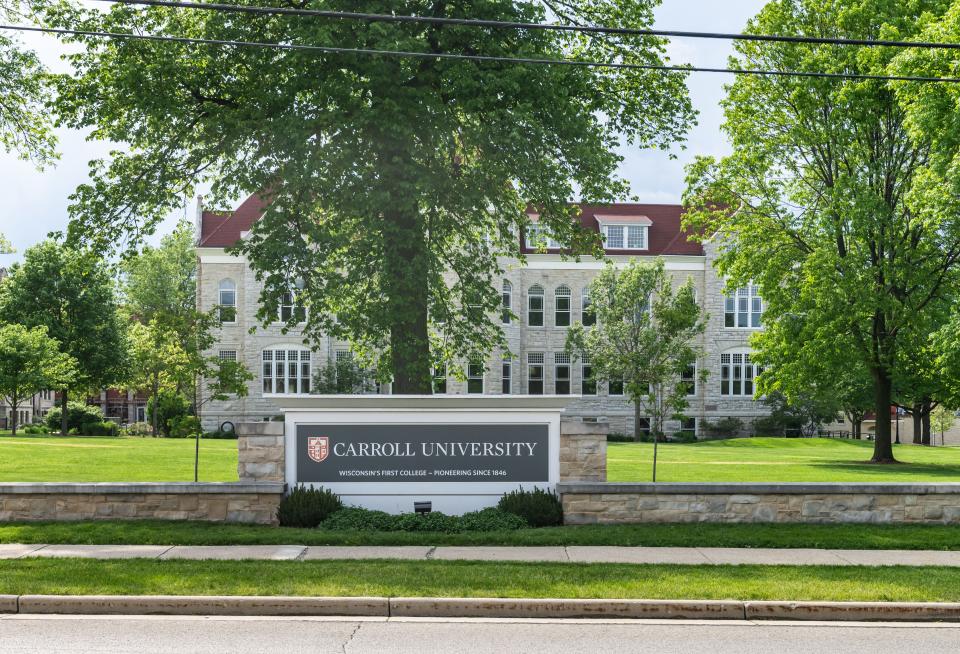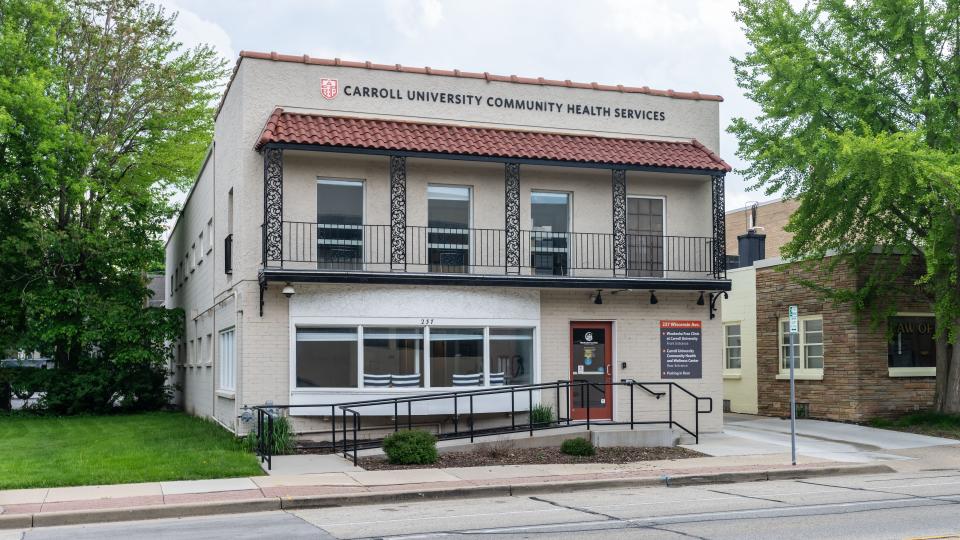Carroll University is offering free mental health counseling services this summer. Here's why.
WAUKESHA – You have insurance but it's the wrong one. You have the right therapist but she's out of network. You have the right insurance but the appointment is eight months away.
It's a frustratingly common set of barriers in the United States, at a time when one in six Americans are seeking or want to seek mental health services, according to the National Council for Mental Well-Being. One in five Americans, or 53 million, report wanting to see a professional but aren't able to, for reasons outside of their control.
In Wisconsin, just half of the more than 800,000 adults with a mental illness are able to receive treatment in Wisconsin, according to the Wisconsin Department of Health Services.

As the director of the Carroll University Community Counseling Center, Jessica Lahner is acutely aware of the problems Wisconsinites face when they seek mental health treatment. That's part of why Carroll University's counseling center will be available free to the wider community from May 16 to Aug. 22 at 237 Wisconsin Ave. in Waukesha, no insurance required.
It's the second summer this free service is being offered.
Lahner developed the program in 2021 amid the rising need for mental health services during COVID-19. One of the biggest obstacles to accessing mental health care, said Lahner, comes from a persistent workforce shortage, one that predates the pandemic. A DHS map of Wisconsin showing designated health professional shortage areas, or HPSA, glows red across much of the state when it comes to mental health, indicating high needs.
"We want to eliminate obstacles and really open our doors to folks who need behavioral and mental health care, regardless of their ability to pay," Lahner said.
How does the free summer clinic work?
Amid an ongoing workforce shortage and high demands for services, a free summer clinic certainly stands out. But there's something of a symbiosis at play at the Community Counseling Center. Of the seven clinicians taking patients this summer, three are graduate students who are working under supervision. It's akin to medical students in clinical rotation and the idea is to get first-hand experience with patients.

Keeley Hamill, a third-year graduate student, is gearing up for her second year offering free summer services to the community. Like anything new, the first year came with a few bumps along the way, like navigating the center's technology. But throughout the process, Hamill said she felt "extremely supported" as she honed her practice and came into her own.
Sara Ruiz, a second-year student who also took part in the free services last summer, said she worked with a diverse set of community members, some of whom struggled with depression and anxiety, others who needed case managers and at least one person with a diagnosis of obsessive compulsive disorder, commonly referred to as OCD.
"It was nice to get feedback (from supervisors) on how we're growing, and to see that we're still acting within evidence-based practices, we're still acting ethically, we're getting really good supervision and we've got a variety of clients," Ruiz said.
The four faculty clinicians who work with the students can count the summer counseling as part of their faculty load, Lahner said, which means they're able to focus on working with the community and supervising graduate students instead of administrative duties.
"I think Carroll's commitment to supporting this clinic is a testament to how this clinic offering is really aligned with not only the values of our training program, but also Carroll as an institution," Lahner said.
How often will the clinic be open?
The clinic will be open twice a week, on Tuesday from 11 a.m. to 7 p.m., and Thursday, 9 a.m. to 5 p.m.
What is the wait period?
Last summer, the Community Counseling Center provided 140 counseling sessions across the summer. Lahner said the center felt hesitant about marketing the services out of fear the demand would outpace what clinicians could offer. That didn't happen.
Instead, they were able to regularly schedule screenings and see clients. The only limitation, Lahner said, had to do with limited services hours. But Lahner doesn't anticipate a waitlist this summer.
The center has the capacity to see 19 clients a week, which is about 260 sessions over the course of 15 weeks.
"We were open two days a week, like we are now and and we considered it a wild success," Lahner said. "And so we're definitely increasing our marketing this summer. We want folks to know that we're here."
Who can access this free service?
Anybody can access the service, regardless of where they live in the state of Wisconsin. That's because the center isn't funded by Waukesha County or the city of Waukesha. As long as you're able to drive to the Carroll University campus or are open to virtual services, Wisconsin residents can take advantage of the free service.
Did the Community Counseling Center turn people away last summer?
Some high-risk symptoms, like suicidality, aren't appropriate for short-term outpatient care.
Last summer, Lahner said the center turned some people away when a screening presented a high risk. These are clients who need emergency crisis services. In such cases, the center is to "do a warm handoff" to providers and partners in the greater Waukesha area or beyond.
"We need to make sure that that client is able to function successfully in between seeing us each week, as an outpatient provider," Lahner said. "If we feel confident that the client may be struggling with chronic severe mental illness, but they are managing well enough over the course of the week and they have support from other providers, they can be a really good fit for us."
What happens after Aug. 22?
Last summer, Lahner and her team were able to successfully refer clients to providers that fit their needs. In some cases, the clients had insurance but their high deductible prevented them from accessing counseling services, so the team helped by coordinating sliding scale services with providers.
Other times, clients were in high-risk relationships that made it hard for them to consistently see a therapist. Lahner and her team get creative about setting up care, such as coordinating with retired licensed practitioners who are willing to work pro-bono through churches and nonprofits.
What needs to change in health care?
When Ruiz, the Carroll University graduate student, was growing up, she didn't see a lot of health care professionals who looked like her as a Mexican American. For her, a lack of cultural competency — the ability to understand, appreciate and interact with people from cultures or belief systems different from one's own — remains an issue that she hopes to see remedied.
Additionally, mental health professionals need to find ways to connect to each other on a regularly basis to avoid burnout, said Hamill, the other Carroll graduate student. At Carroll University, graduate students have a strong connection, but once they get into private practice, "you just get into your little bubbles."
One way to pop that bubble is by creating more opportunities for integrated health care where medical and behavioral health care practitioners can work within one clinic, Lahner said. It's a mindset that both Ruiz and Hamill agree would help create holistic practices that give patients more options.
"I think that one of the most important things that Carroll has taught us is connect, connect, connect," Hamill said. "We're all in this together. We cannot be standalone or else we will burn out. And if we're burnt out, then there's no one left to be able to offer these services."
How do I sign up for free counseling services?
People interested in making an appointment can visit carrollu.edu/carroll-community-counseling-center and clicking the orange button, "Make an appointment." For more information, call 262-951-3127 or email ccc@carrollu.edu.
Natalie Eilbert covers mental health issues for the Milwaukee Journal Sentinel. She welcomes story tips and feedback. You can reach her at neilbert@gannett.com or view her Twitter profile at @natalie_eilbert. If you or someone you know is dealing with suicidal thoughts, call the National Suicide Prevention Lifeline at 988 or text "Hopeline" to the National Crisis Text Line at 741-741.
This article originally appeared on Milwaukee Journal Sentinel: A free counseling service at Carroll University aims to reduce barriers

